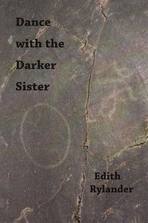Book Review
Dance with the Darker Sister by Edith Rylander. Red Dragonfly Press, 2010. $15
Reviewed by Linda Aschbrenner
Edith Rylander of Minnesota has been writing poetry since 1943. Two earlier volumes of her poetry are Dancing Back the Cranes (North Star Press) and Hive Dancer (Red Dragonfly Press). She has also published Rural Routes: Essays on Living in Rural Minnesota, and with her husband, John D. Rylander, Journeying Earthward and What’s in a Poem. After reading her recent book, Dance with the Darker Sister, one wants to explore all her earlier works.
Because family history as poetry happens to be one of my addictions, I eagerly read Dance with the Darker Sister, a book about and dedicated to Rylander’s parents and grandparents. Perhaps we don’t think of turning to poetry to learn about our frontier history, but Rylander gives us this side benefit. Through her relatives we come to know something about mining, lumberjacking, crop dusting, dry farming, and hardships.
Rylander shapes her memories using specific sensory details—turns family experiences into music. She writes with restraint and honesty without falling into sentimentality. The poems are clear and accessible giving us just enough details, and perhaps a longing for a full autobiography.
And because of my affection for such narratives, I wish this entire 105-page book would have been exclusively about family. I would have jettisoned the poems about Lewis and Clark and some of the poems in the last section. Furthermore, these poems could have been grouped by family member—it would then be easier to follow the lives of the grandfather, grandmother, father, mother, cousins, sister, husband. And why not: I would have enjoyed many more poems about Rylander’s memories of her own life. In addition, the poems, all enlightening narratives, would have worked well, or better, as prose poems.
Rylander writes about her sister Joy who died at age 21. The Joy poems have controlled emotion while revealing much about their relationship along with Rylander’s regrets. From the title poem:
In all of those childhood pictures,
She is the darker sister,
The feisty mite with hands on her hips.
I am the one behind, the blonde, the shy one.
She was the dancer, the darter, the bold
Thief of the kitchen matches when we played Indian,
And I thought we needed a campfire—
The Virginia City Fire Department came that time.
Friend-maker, boy-snatcher, learner of new dances,
Mistress of slang when they called me “Walking Dictionary,”
The popular one, the one who married early,
The one whose dance went wrong, the broken one. (69)
While many of Rylander poems are more prose than poetry, poetic techniques are gracefully in evidence in this poem. In the above stanzas, the poem is brighter for the alliteration, internal rhyme, repetition of the word “one,” and the string of bold verbs: friend-maker, boy-snatcher, learner.
Another of my favorite poems from this collection is “California Dead” where the past and present are compared and intermingled. Rylander makes good use of historic detail giving credence to the era, and uses “cannot” as a haunting refrain. In this poem, Grandma (from California) admonished her relatives not to put up a tombstone when she dies, not to bring flowers or to visit. She tells them, “It’s heathen superstition/ To pay the slightest attention to a body.”// “I will not be in that casket./ I will be in Heaven,/ In Glory with my Lord, / And with all the good Christian people/ I ever loved./ Yes, girls, yes, of course I’ll see you there.”
Rylander reflects on this and finds a powerful conclusion to the poem:
We did as we were told.
With Grandma, one did
As one was told.
……………………………
So I cannot go
To my California dead
As we go every year to those Minnesota graveyards
To plant out the boxes
For Petersons and Rylanders.
……………………………
Cannot bring any green thing to that earlier woman
For whom I am named,
Who brought Heavenly Blue morning glories
Out of gray Nevada
Mining-town soil in Gold Hill,
And beat Hitler personally with the fruits
Of her Sunnyvale victory garden.
…………………………………
Cannot go, ever, to the graves
Of my California dead.
Cannot come, if I wished to,
To the place where they are. (64)
Fortunately, we can go many places with Edith Rylander—following her lines of poetry and heritage. I’m glad I didn’t miss this trip.
Linda Aschbrenner is the editor/publisher of Marsh River Editions. She edited and published the poetry journal Free Verse from 1998 to 2009 which now continues as Verse Wisconsin.


